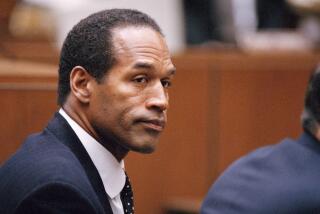SHOUTING IT LIKE IT IS : We Can Solve All the Scandals We Want, but Until We Target Racism, We Are Doomed
- Share via
I’ve been waiting half my life to tell somebody about Leslie Goldman. Always figured I’d wait for some desperate moment. Now it’s here.
I’ve been thinking about some pretty bizarre things these last few weeks. Life in Los Angeles has been pushed to its limits. We’re standing at the brink of something new and terrible. This is what it must have been like to watch the first atomic test at Los Alamos, to marvel in terror at the energy unleashed and wonder if it could ever be channeled to do good. I wonder now. I feel as if I’ve been listening to millions of people chant a Langston Hughes line: Looks like what drives me crazy don’t have no effect on you--but I’m gonna keep on at it till it drives you crazy, too.
I’m being driven crazy, all right. Weird songs whirl in my head. I hear Elvis singing “In the Ghetto.” It makes me appreciate the most mundane things. Like standing in a long line to buy tacos at Washington and Sepulveda in Culver City on a Friday evening. You know what I’m digging? The civility, the simple fact that there’s no pushing, that everyone is waiting his turn, that no one has to watch his back for trouble. I saw things the other way in person during those days of madness. It scared me. It was supposed to. Let’s all remember that fear. Let’s all remember what happens when you push people too far.
And let’s remember what Leslie Goldman said. He said it a long time ago. Not on TV, not on radio--he just shouted it. It was 22 years ago this month, the day after National Guardsmen killed four anti-Vietnam War demonstrators at Kent State University in Ohio. Leslie was a student at Cal State Northridge. Even here, in the placid San Fernando Valley, there was rage at our government’s invasion of Cambodia, especially from people old enough to be drafted.
Leslie was a short, white guy with glasses and unkempt hair. He didn’t stand out until that afternoon when hundreds of students headed from classrooms toward the building where anti-war activists were distributing get-out-of-Cambodia postcards for students to mail to President Nixon. The students, filled with earnest fury, rushed up a low, grassy hill to the building where the postcards were being handed out. In their path stood Leslie, alone. He was yelling at them.
“Listen!” he shouted. “It doesn’t make any difference whether we end the war unless we solve the problem of racism!” Nobody listened. They ran right by him. The war was the thing. Racism was last year’s problem.
You could have frozen that image in time and put it on a postage stamp to commemorate the official and unofficial policy of the United States government and of We, the People. Racism or poverty or unemployment--whatever social problem you want to name--is always Number Two. More transitory problems--the savings and loan scandal, the House banking scandal--always get the attention. The response to Problem Number Two is always “We’ll get to it.” The time frame is always tomorrow.
That’s what happened here. And the saddest thing about it was that everybody knew it. People who voted for Proposition 13 knew it. Municipal officials who let the trash pile up and the paint chip in our city housing projects knew it. Trickle-down politicians and economists who sold us on the doctrine of government as a disease knew it. They knew the monstrous evils building here. It’s just that the evils were always Number Two, like the cookie crumbs in your car trunk.
What I hope for now--scratch that. What I pray for now is somebody in authority to step forward and say, dammit, Number Two is now Number One. But that’s not going to happen unless we do some shouting ourselves. Our leaders are running up that low, grassy hill, running pell-mell toward the Next Big Issue. They need to be slapped in the face. What’s happened in recent weeks got their attention temporarily. But we need, all of us, to position ourselves in their path and to scream at them, as Leslie did: “Listen! It doesn’t make any difference unless we solve the problem of racism!”
This is no longer just a matter of misplaced priorities. This is a matter of our city’s life and death.
More to Read
Sign up for Essential California
The most important California stories and recommendations in your inbox every morning.
You may occasionally receive promotional content from the Los Angeles Times.










